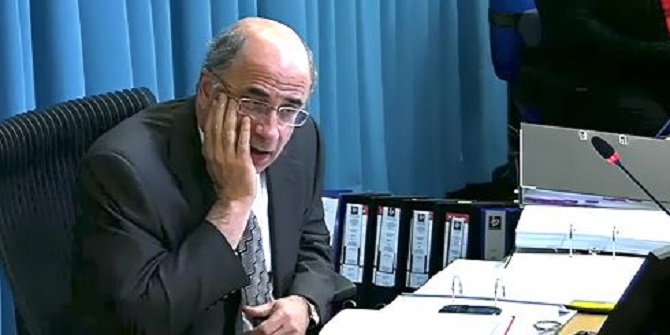By Bart Cammaerts and Bingchun Meng
Just as wiretapping is considered a threat to civil liberties in most democratic countries, the large-scale online surveillance that the Digital Economy Act authorises will be perceived as a threat to users’ privacy. Given such perceptions, there are likely to be two kinds of reactions. One is that users will seek technological means to protect their online privacy, such as using IP–filtering software or sending encrypted files. This could result in an “arms race” between surveillance attempts and anti-surveillance tactics. The second possible reaction is that once users lose trust in the online environment or become confused about the legality of their behaviour, they will retreat from their regular and often essential online activities, impeding the functioning of their daily life. Both reactions will lead to total welfare loss, yet none of these have been taken into account by the DEA (Mansell and Steinmueller, 2010).
In addition, the complexity of monitoring online behaviour also means that users might become the frequent victims of wrong accusations. In order to identify heavy infringers, the DEA adopts a fundamentally flawed method of matching P2P traffic with IP addresses. In any given household one IP address can be shared by several individual users, not to mention the difficulty of identifying infringers on community WIFI or public access points such as schools and libraries. Already there has been the case of an innocent couple being threatened by a law firm for distributing a video game online, even though the couple had neither WiFi in their home nor did they play computer games (Sabbagh, 2010). This problem will certainly exacerbate once the Act takes effect.
Finally, there is also a more fundamental issue at play here. Namely, is it acceptable that an administrative body can order citizens to be disconnected from a vital information and communication infrastructure such as the internet, effectively curtailing their right to communicate deemed to be a human right? Dealing with this contentious question, the European Parliament (2008) urged member states and the Commission
“to recognize that the Internet is a vast platform for cultural expression, access to knowledge, and democratic participation in European creativity, bringing generations together through the information society; calls on the Commission and the Member States, therefore, to avoid adopting measures conflicting with civil liberties and human rights and with the principles of proportionality, effectiveness and dissuasiveness, such as the interruption of Internet access.”
In 2009, the French Constitutional Council followed a similar argument when it deemed measures voted by the French Parliament – similar to those in the DEA – unconstitutional and disproportional. It stated that the:
“freedom of expression and of communication is so precious that its exercise is a condition for democracy and one of the guaranties for respecting other rights and freedoms; limiting this liberty must necessarily be adapted and proportional to the pursued aim.” (Conseil Constitutionnel, 2009: art. 15 – our translation)
What is certain though is that in the UK, issues concerning civil liberties and privacy in the whole debate on filesharing and the (technical) means to curtail it, have not been examined and considered in depth before the Act was voted and this should be rectified.
References:
Conseil Constitutionnel (2009) Loi favorisant la diffusion et la protection de la création sur internet. Décision n° 2009-580 DC du 10 juin: http://www.conseil-constitutionnel.fr/conseil-constitutionnel/francais/les-decisions/2009/decisions-par-date/2009/2009-580-dc/decision-n-2009-580-dc-du-10-juin-2009.42666.html
European Parliament (2008) Report on the Cultural Industries in Europe. 10 April. http://www.europarl.europa.eu/sides/getDoc.do?pubRef=-//EP//NONSGML+TA+P6-TA-2008-0123+0+DOC+WORD+V0//EN
Mansell, Robin and Steinmeuller, Ed (2010) British Telecommunications plc (“BT”) and TalkTalk Telecom Group Limited v Secretary of State for Business, Innovation and Skills (“BIS”) In the matter of an intended claim. 1 July. London: LSE enterprise.
Sabbagh, Dan (2010). Digital Economy Act likely to increase households targeted for piracy: Fears increase that law firms may home in on innocent web users who don’t illegally download. http://www.guardian.co.uk/media/2010/apr/12/digital-economy-bill-households-piracy




